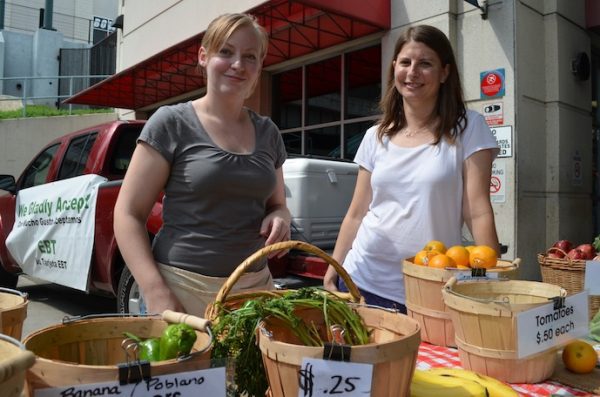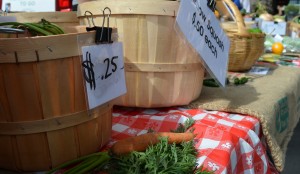Anthropology Major Takes Food Desert Personally; Researches Solutions

People who live in food deserts in Charlotte struggle to find healthy fresh food. Lauren Whipp, who as an undergraduate anthropology major began researching the topic, takes this issue personally.
“I actually live in one of the neighborhoods that is designated as a food desert – an area that does not have access to healthy food,” Whipp said. “Being a part of a neighborhood, I think about my neighbors and if they are able to get their children food. I have a number of elderly neighbors. Are their needs being met? The closest bus stop is not very close, and we have folks taking the bus all the way to the grocery store.”
Whipp has felt the issue in her own childhood home. “I draw on personal experiences from when I was much younger,” she said. “I grew up in a very poor family. We relied on the help of organizations in my hometown to make sure we were fed as children. My memories of empty cabinets are prevalent. I think about how these organizations help my neighbors and how the city as a whole structure is trying to help.”
While she has long been interested in the topic, Whipp expanded her formal research into food access issues as an undergraduate Charlotte Research Scholar in the summer of 2013. Nicole Peterson, assistant professor of anthropology, served as Whipp’s mentor in her studies of local food distribution. Peterson is also a member of the Charlotte Mecklenburg Food Policy Council Experts Panel.
“Lauren was an exceptional research assistant, and she was able to develop her own direction for the CRS project that really added to our understanding of urban farms as part of the Charlotte food system,” Peterson said.
 With her graduation in May, Whipp is continuing her focus on food security problems. Among other things, she is researching equality issues. Rather than considering consumers exclusively, Whipp is exploring the barriers that producers and distribution organizations face, including a need for volunteers and education and a lack of access to funding and land.
With her graduation in May, Whipp is continuing her focus on food security problems. Among other things, she is researching equality issues. Rather than considering consumers exclusively, Whipp is exploring the barriers that producers and distribution organizations face, including a need for volunteers and education and a lack of access to funding and land.
To deepen her knowledge and connect her scholarship with her commitment to the community, Whipp volunteers with local food initiatives, such as Friendship Gardens, a network of community, school, faith-based, institutional, public, private, and backyard gardens. Most of the garden partnerships share their harvest for the benefit of Friendship Trays, providing meals to community members with limited access to healthy food.
Whipp hopes that her research will inspire others to learn about the issue and commit time and other resources to finding solutions.
“Strengthening the community is a great way of solving a lot of the problems the city is presented with,” she said. “All good things come back to you in the end, so when you make these self-sacrifices for the greater good of the community it benefits everyone.”
Words: Asia Dacosta, college Communications and Marketing Office student assistant